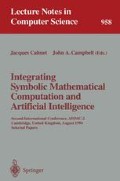Abstract
We describe a small but non-trivial 3-agent-robotics scenario by two different methods, viz. resource-oriented deductive planning and logical fiberings. The ultimate aim is to find a semantics for planning methods by means of fiberings. To this end, a comparison of the two methods is made and illustrated by the sample scenario, and the correspondences between the basic notions for both methods are clarified. The fiberings method is found to be useful in modeling communication and interaction between cooperating agents, thanks to the local/global distinction that is inherent to this framework. Possible extensions of the framework, like e.g. formulas dependent on space and/or time, are discussed.
Preview
Unable to display preview. Download preview PDF.
References
J. Allen, J. Hendler, and A. Tate. Readings in Planning. Morgan Kaufmann, San Mateo, 1990.
W. Bibel. A Deductive Solution for Plan Generation. New Generation Computing, 4:115–132, 1986.
A.H. Bond and L. Gasser, editors. Readings in Distributed Artificial Intelligence. Morgan Kaufmann Publ., San Mateo, California, 1988.
S. Brüning, S. Hölldobler, J. Schneeberger, U. C. Sigmund, and M. Thielscher. Disjunction in Resource-Oriented Ddeductive Planning. Technical Report AIDA-94-03, Intellektik, Informatik, TH-Darmstadt, March 1994.
E. Csuhaj-Varju and J. Kelemen. On the power of cooperation: a regular representation of recursively enumerable languages. Theoretical Computer Science, 81:305–310, 1991.
F. Dargam, J. Pfalzgraf, K. Stokkermans, and V. Stahl. Towards a toolkit for benchmarking scenarios in robot multi-tasking. Technical Report 91-45.0, RISC-Linz, J. Kepler University, Linz, Austria, Europe, 1991.
L. Gasser and M.N. Huhns, editors. Distributed Artificial Intelligence. Morgan Kaufmann Publ., San Mateo, and Pitman, London, 1989.
G. Gro\e, S. Hölldobler, J. Schneeberger, U. Sigmund, and M. Thielscher. Equational Logic Programming, Actions, and Change. In Proc. Joint International Conference and Symposium on Logic Programming JICSLP'92, 1992.
S. Hölldobler and J. Schneeberger. A New Deductive Approach to Planning. New Generation Computing, 8:225–244, 1990.
S. Hölldobler and M. Thielscher. Actions and Specificity. In D. Miller, editor, Proceedings of the International Logic Programming Symposium (ILPS), pages 164–180, Vancouver, October 1993. MIT Press.
J. Kelemen. Syntactical models of distributed cooperative systems. J. Expt. Theor. Artif. Intell., 3:1–10, 1991.
V. Lifschitz. Formal theories of action. In International Joint Conference on Artificial Intelligence, pages 966–972. Morgan Kaufmann Publishers, Inc., 1987.
M. Masseron, C. Tollu, and J. Vauzielles. Generating Plans in Linear Logic. In Foundations of Software Technology and Theoretical Computer Science, pages 63–75. Springer, volume 472 of LNCS, 1990.
J. McCarthy. Situations and Actions and Causal Laws. Stanford Artificial Intelligence Project, Memo 2, 1963.
J. McCarthy. Applications of circumscription to formalizing common-sense knowledge. Artificial Intelligence, 28:89–116, 1986.
J. McCarthy and P. Hayes. Some philosophical problems from the standpoint of artificial intelligence. In B. Meltzer and D. Michie, editors, Machine Intelligence, vol. 4, pages 463–502. Edinburgh University Press, Edinburgh, 1969. Also published in: [1].
J. Pfalzgraf. On geometric and topological reasoning in robotics. Submitted to the Special Issue on Artificial Intelligence and Symbolic Mathematical Computation of the Annals of Mathematics and Artificial Intelligence.
J. Pfalzgraf. Logical fiberings and polycontextural systems. In Philippe Jorrand and Jozef Kelemen, editors, Proc. Fundamentals of Artificial Intelligence Research, LNCS 535 (subseries LNAI), pages 170–184, 1991.
J. Pfalzgraf and K. Stokkermans. Scenario construction continued and extended with a view to test and enhancement of reasoning methods. Technical Report 92-27, RISC-Linz, J. Kepler University, Linz, Austria, Europe, May 1992.
J. Pfalzgraf and K. Stokkermans. On robotics scenarios and modeling with fibered structures. In J. Pfalzgraf and D. Wang, editors, Springer Series Texts and Monographs in Symbolic Computation, Automated Practical Reasoning: Algebraic Approaches. Springer Verlag, 1994.
E. Shapiro and A. Takeuchi. Object oriented programming in Concurrent Prolog. New Generation Computing, 1:25–48, 1983.
U.C. Sigmund. LLP — Lineare Logische Programmierung. Master's thesis, Intellektik, Informatik, TH Darmstadt, 1992.
Author information
Authors and Affiliations
Editor information
Rights and permissions
Copyright information
© 1995 Springer-Verlag Berlin Heidelberg
About this paper
Cite this paper
Pfalzgraf, J., Sigmund, U.C., Stokkermans, K. (1995). Modeling cooperating agents scenarios by deductive planning methods and logical fiberings. In: Calmet, J., Campbell, J.A. (eds) Integrating Symbolic Mathematical Computation and Artificial Intelligence. AISMC 1994. Lecture Notes in Computer Science, vol 958. Springer, Berlin, Heidelberg. https://doi.org/10.1007/3-540-60156-2_13
Download citation
DOI: https://doi.org/10.1007/3-540-60156-2_13
Published:
Publisher Name: Springer, Berlin, Heidelberg
Print ISBN: 978-3-540-60156-2
Online ISBN: 978-3-540-49533-8
eBook Packages: Springer Book Archive

